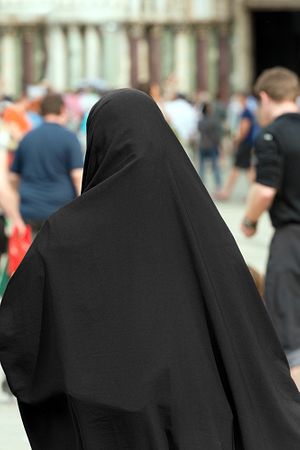On Monday, a woman dressed in all black pulled the severed head of a child from her bag and held it aloft outside a Moscow metro station. She reportedly shouted “Allahu Akbar” and “I am a terrorist, I want your death,” until she was detained by police. The videos captured by bystanders are distributing, to say the least. According to the authorities, 38-year old Gyulchekhra Bobokulova, an Uzbek nanny, killed and beheaded the child, aged three or four, in her care and then set fire to the apartment of her employers before going to the metro.
The grisly incident has been met with a surprising amount of calm on the part of the Kremlin–which routinely whips up anxieties about Islamic extremism in Central Asia.
While the story received a flood of coverage in online media and on social media, according to several regional watchers it was not covered by the federal news service on Russian television. As Tom Balmforth noted for RFE/RL, this is in contrast to the Russian media frenzy over similarly macabre incidents elsewhere (which didn’t even really happen):
In July 2014, Russia’s state-run Channel One reported from war-torn eastern Ukraine that a 3-year-old Russian boy had been crucified by Ukrainians, sparking outrage among many ethnic Russians in Ukraine — though the story turned out to be untrue.
Earlier this year, Russian TV stations reported on what they described as the abduction and gang rape by migrants of a teenage girl whose family emigrated from Russia, sparking outcry among many Russians living in Germany. That, too, turned out not to have happened.
As Balmforth goes on to note, some believe the Russian government has instructed major media outlets to avoid the story. The Kremlin denies the allegation, but President Vladimir Putin’s spokesman Dmitry Peskov said, “As far as we know, the channels indeed have taken a decision not to show this horrible tragedy… And it seems to me, one can only express solidarity with this decision of the channels because this is probably too monstrous to be shown on television.”
There are reasonable concerns that reporting could ignite the kind of anti-migrant worker sentiments which already pervade nationalist circles. In 2013, the murder of a Russian by an Azerbaijani migrant worker sparked large riots in Moscow — nationalists smashed windows and terrorized migrant neighborhoods. The authorities joined in, raiding several warehouses and arresting hundreds of migrant workers.
As the economic crises continues across the region, the pressure on migrant workers in Russia will continue to rise. Three Central Asian states — Tajikistan, Uzbekistan, and Kyrgyzstan — send millions of migrant workers to Russia each year. Many come illegally and have for decades worked as nannies, laborers, or street sweepers and in other menial or harsh jobs. Rights activists have warned for years that migrant workers in Russia — both legal and illegal — are at risk. In a 2014 letter to the UN Special Rapporteur on the Human Rights of Migrants and the UN Independent Expert on Minority Issues, Human Rights Watch warned, “Migrants in Russia, particularly those from Central Asia, and ethnic minorities from Russia’s Northern Caucasus are at risk of discrimination, racial profiling and police harassment, and xenophobic violence.”
The issue of migrant workers in Russia has been politically sensitive for years, but even more so given Russia’s economic depression. The double standard with regard to reporting on the incident indicates an awareness of this fragility, which is usually absent from Russian-sourced reporting on the threat of terrorism in Central Asia.
Wednesday, Bobokulova appeared in court and said she accepted her guilt. She also said that “Allah ordered” her to act as she did. In RFE/RL’s video she can be seen waving, a glazed look on her face. Shortly after she was detained on Monday, investigators said they weren’t treating the case as terrorism but, according to the BBC, “prosecutors also said they believed that Bobokulova had been ‘incited’ to commit the crime.” The authorities say Bobokulova will undergo a psychiatric evaluation. As the AFP reported, Moskovsky Komsomolets (a sensationalist daily newspaper in Moscow), cited Uzbek police as saying Bobokulova suffered from schizophrenia.
Russian authorities certainly have motivation to attribute the incident to mental instability in place of terrorism, rather than both. Terrorism in the heart of Moscow contradicts the Kremlin’s messaging. There can be no question that a person who would kill and behead a child is deranged, but Russia’s disconnected and downtrodden migrant communities are prime recruiting ground for groups like ISIS, so there could be more to the incident. On the other hand, however, there may not be. If only Russian media were so careful when reporting on the wave of terrorism (not) sweeping Central Asia.

































